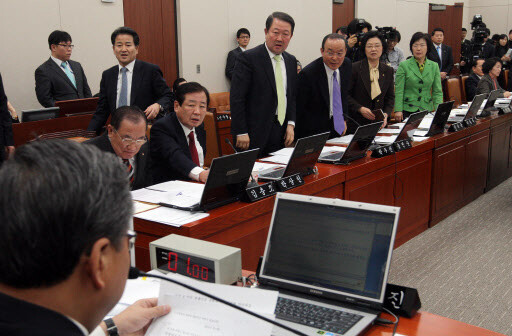hankyoreh
Links to other country sites 다른 나라 사이트 링크
GNP Lawmakers pass North Korean Human Rights Law

In a plenary session Thursday morning, the National Assembly’s Unification, Foreign Affairs and Trade Committee passed the North Korean Human Rights Law. All of the Democratic Party (DP) lawmakers who hold seats on the committee walked out after expressing their opposition to the bill and issued a statement condemning the law.
In accordance with its goal to create basic and executive plans to promote North Korean human rights and push North Korean human rights-related projects in what its supporters are calling a consistent and systematic way, the North Korean Human Rights Law calls for the establishment of an advisory committee for North Korean human rights within the Unification Ministry, the establishment of a North Korean human rights foundation to conduct studies on North Korean human rights, research policy and conducting activities to improve human rights in North Korea, provision of support for civic groups related to North Korean human rights, the submission of reports on North Korea’s human rights situation to the National Assembly and increasing limits for humanitarian aid to North Korea to prevent its use by the North Korean military.
The Democratic Party voiced strong opposition, saying it plans to take committee Chairman Park Jin to the National Assembly Ethics Committee for ignoring their objections. In its statement, the DP condemned the law, and criticized the ruling Grand National Party (GNP) for railroading the law through the committee. The DP is saying the law would not contribute to improvements in North Korean human rights, rather, they are saying it is an “Anti-North Korean Citizens Law,” and the North Korean government, who views the law as a threat to their government, could repress the actual human rights of North Koreans by strengthening its controls over them. The DP also says the law bans humanitarian aid to North Korea by strictly limiting humanitarian assistance and is a “New Right Support Bill” to support groups that send balloons and pamphlets to North Korea under the guise of promoting North Korean human rights.
DP Lawmaker Chung Dong-young said the current administration is setting as its departure point the Basic Agreement of 1991, signed during the Roh Tae-woo administration, but the law clashes with the spirit of the agreement, which calls on both countries not to slander or commit libel against the other country’s government. Chung asked whether the administration could hold an inter-Korean summit with this law in effect.
Civic groups also slammed the law. Koo Kab-woo, head of the People’s Solidarity for a Participatory Democracy’s (PSPD) Center for Peace and Disarmament, said it is possible to address the North Korea human rights issue under the Inter-Korean Relations Development Law passed by the ruling and opposition parties in December 2005, and he does not understand why it was necessary to unilaterally pass the North Korean Human Rights Law at this time. Suh Bo-hyuk, research fellow of the Korea National Strategy Institute, said there is concern that by making the Ministry of Unification the primary body to handle North Korean human rights policy, the law could weaken the ability of the ministry to negotiate with North Korea and have an adverse effect on the development of inter-Korean relations and bringing about substantive improvements in North Korean human rights.
Please direct questions or comments to [englishhani@hani.co.kr]
Editorial・opinion
![[Column] Has Korea, too, crossed the Rubicon on China? [Column] Has Korea, too, crossed the Rubicon on China?](https://flexible.img.hani.co.kr/flexible/normal/500/300/imgdb/original/2024/0419/9317135153409185.jpg) [Column] Has Korea, too, crossed the Rubicon on China?
[Column] Has Korea, too, crossed the Rubicon on China?![[Correspondent’s column] In Japan’s alliance with US, echoes of its past alliances with UK [Correspondent’s column] In Japan’s alliance with US, echoes of its past alliances with UK](https://flexible.img.hani.co.kr/flexible/normal/500/300/imgdb/original/2024/0419/2317135166563519.jpg) [Correspondent’s column] In Japan’s alliance with US, echoes of its past alliances with UK
[Correspondent’s column] In Japan’s alliance with US, echoes of its past alliances with UK- [Editorial] Does Yoon think the Korean public is wrong?
- [Editorial] As it bolsters its alliance with US, Japan must be accountable for past
- [Guest essay] Amending the Constitution is Yoon’s key to leaving office in public’s good graces
- [Editorial] 10 years on, lessons of Sewol tragedy must never be forgotten
- [Column] A death blow to Korea’s prosecutor politics
- [Correspondent’s column] The US and the end of Japanese pacifism
- [Guest essay] How Korea turned its trainee doctors into monsters
- [Guest essay] As someone who helped forge Seoul-Moscow ties, their status today troubles me
Most viewed articles
- 1[Column] The clock is ticking for Korea’s first lady
- 2Samsung barricades office as unionized workers strike for better conditions
- 3S. Korea, Japan reaffirm commitment to strengthening trilateral ties with US
- 4[News analysis] After elections, prosecutorial reform will likely make legislative agenda
- 5[Editorial] When the choice is kids or career, Korea will never overcome birth rate woes
- 6Japan officially says compensation of Korean forced laborers isn’t its responsibility
- 7[Editorial] As it bolsters its alliance with US, Japan must be accountable for past
- 8Why Israel isn’t hitting Iran with immediate retaliation
- 9[Column] Has Korea, too, crossed the Rubicon on China?
- 10All eyes on Xiaomi after it pulls off EV that Apple couldn’t